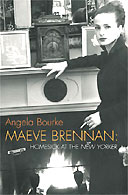
Maeve Brennan: Homesick at The New Yorker
by Angela Bourke
Cape £16.99, pp333
So assured are Maeve Brennan's stories of Ireland between the wars and so complete New York's continuous renewal that few guessed at a turmoil which might have been far worse without sympathy and encouragement from the New Yorker.
Even so, Brennan slipped from whimsical fiction to trashing an editor's office. Release from hospital brought vigils outside a magazine to which she was incapable of contributing for the last two decades of a life, which ended at 76 in 2003. She was all but forgotten in America, and only recently published here.
If Angela Bourke's biography lacks economy and wit, its disinterring of life behind the stories has some interest. Brennan's Irish republican father, Bob, was jailed for five years. But after a third of Bourke's narrative, however, Brennan is still aged nine and we have had a potted Irish history and several times read Erskine Childers's phrase about 'the gay pursuit of a perilous quest'. Childers was duly executed, but Bob was made Secretary of the Irish Legation in Washington by Eamon de Valera in 1933.
A decade later, the family returned home. Maeve, sharp and beautiful, stayed on and moved to New York. She provided witty fashion notes for Harper's Bazaar , and, in making fiction from family history, came into the orbit of the New Yorker . Her work fostered by William Maxwell, she was at ease in the bar-world. In passing, we learn that she was Charles Addams's lover. Black comedy indeed was her professing such love for Walter Kerr that the theatre critic could never work for the magazine. Her marriage to fellow writer St Clair 'Bill' McKelway was amicably doomed; and mutually feckless. Brennan's life was a catalogue of short lets.
What endures is the fiction, notably the Irish work The Springs of Affection, whose title story is a sour, inaccurate view of a marriage by the dead husband's twin sister. All her other stories are now gathered in an American volume, The Rose Garden. Several offer a dog's eye view of Manhattan: a labrador, Bluebell, pictures the Atlantic behind a West Tenth Street door at which she looks ever hopefully. 'Every roof turns into a magic carpet as soon as someone is standing on it.' This could equally sit in The Long-Winded Lady, her anonymous mini-chronicles of Manhattan incidents based around homely restaurants and fading hotels. 'Most of the time the street looks like a short cut to the city dump.'
In fact, 'at home or away, we are homesick for New York not because New York used to be better and not because she used to be worse but because the city holds us and we don't know why'. Brennan, ever imaginative, understood herself in a way her biographer's matter of fact study can never achieve.

